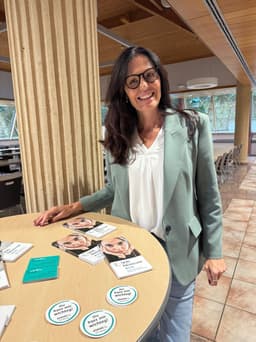50 years of assistance: an interview with SOS Détresse

Sometimes life is far from the beautiful picture painted by the media and social networks. It is sometimes impossible to cope with stress, loneliness or depression on your own. Fortunately, there are people in Luxembourg who can listen and help.

Getty Images
Please briefly describe the mission of SOS Détresse and the main services you offer
The aim of our commitment is to offer discreet help to people in need via telephone, email or chat counselling:
- People with a need for clarification and a desire for dialogue, whether on a specific, sensitive topic or on their general life situation,
- People in acute life, partnership, family and suicidal crises,
- People who have been in difficult life situations for a long time and suffer from health problems, psychological stress, addictions or loneliness.
Who can contact you? Are there any restrictions in terms of age, nationality, language or income? In which languages is support available? Are you planning to expand the range of languages available?
Our counselling service is aimed at adults without further restrictions by telephone in Luxembourgish, German, French and English. In online counselling (mail and chat counselling) also in Portuguese.
Through which channels is support available (telephone, chat, e-mail)? Are all channels confidential and anonymous?
Our service is offered anonymously and confidentially via telephone, chat and email counselling. Anonymity and its guarantee across all channels is explained in our privacy policy: https://454545.lu/de/datenschutzerklaerung/
What are the opening hours of your support services? Are there extended hours for emergencies?
Telephone: Our volunteers are there for you every day from 11 a.m. to 11 p.m. - on Fridays and Saturdays until 3 a.m. in Luxembourgish, German and French. The English-speaking line is available on Wednesdays, Saturdays and Sundays from 11am to 11pm.
Mail: Available at any time, reply within three days
Chat: Our chat service is available on Mondays and Thursdays from 5 to 9 pm in Luxembourgish, German, French, English and Portuguese.
How can you prepare for the first contact in order to receive the most effective support? What mental or emotional challenges do you specialise in (e.g. depression, anxiety, suicidal thoughts, stress, isolation)?
We have no specialisation in this sense; anyone in a crisis situation or going through a difficult time can turn to us. We offer an empathetic listening space, convinced that sometimes just one conversation can make a real difference.
Is further support offered after the first contact? If so, how is this organised?
Our support services - whether by phone, email or chat - are one-off, anonymous support offered by trained volunteers. It is also possible to contact us as often as the person needs. By contacting the service, the person is not making a long-term commitment: they decide when to call or write and what they want to talk about. However, this is not a substitute for therapy or long-term counselling;
What steps do you recommend when a loved one is in a crisis situation? Can you also ask for help for others?
You can call, write or chat to us if you are worried about another person, e.g. because they seem sad, desperate or suicidal.
If someone close to you is in a crisis situation, we recommend first keeping calm and listening:
- Give the person concerned space to speak - without interrupting or judging them.
- Show understanding ("I can see that you are feeling very bad at the moment") and signal that she is not alone.
Please take all statements seriously: If someone says they no longer want to live, this should always be taken seriously - even if it is unclear how specific the intention is.
Inquire and offer help: Don't be afraid to ask if the person has specific thoughts of suicide or self-harm.
If so, do not leave the person alone if possible and try to call in professional help together (e.g. emergency number 112, family doctor, psychiatric clinic). If you have the impression that there is an acute danger to life, call the emergency number (112) immediately.
Recognising excessive demands and sharing responsibility: You are not solely responsible. It is absolutely right to seek outside help - even if the person concerned initially refuses.
What are the common misconceptions about psychological help in Luxembourg and how can they be dispelled?
"Anyone who seeks help is weak / crazy" (stigmatisation)
How you can clear it up: Talk openly and non-judgementally about mental health (normalise!). Emphasise that seeking help is responsible and shows self-care - not a sign of weakness. Share reliable information (e.g. figures on the frequency of mental health problems) and named contact points.
"Only 'blatant' cases need psychotherapy / I have to be "very ill" first"
Psychotherapy and psychosocial counselling help with a wide range of problems (stress, anxiety, grief, relationship crises) - not just acute psychosis or suicidal tendencies. Early seeking often improves the prognosis. (General evidence and recommendations; see also overview of care services in Luxembourg)
Encourage affected persons to attend an initial consultation - this often clarifies whether and what form of support is appropriate.
"Therapy doesn't help / is just talking"
There are well-researched, effective forms of therapy for many psychological problems (e.g. cognitive behavioural therapy). Therapy works with structured methods, goals and practical exercises.
Explain that therapy is often an active process with clear goals.
Give examples of specific exercises (e.g. stress management, problem-solving planning).
Can you give a step-by-step guide? What to do and who to contact if someone is in need?
Make a judgement: Is there an acute danger to life? Examples of acute danger: unconscious person, serious injuries, serious respiratory or circulatory problems, or if someone immediately says they want to kill themselves.
- In case of acute danger: call 112 immediately
- Feel free to state: who you are (or say that you wish to remain anonymous), what is happening, where (exact address/location) and how many people are affected. If necessary, have your telephone ready for further enquiries.
If the person is acutely suicidal (concrete intentions/plans):
- Stay with the person if it is safe to do so.
- Remove hazards (e.g. sharp objects, medication) as far as possible without risk.
- Call 112 or the police 113 if there is immediate danger.
If there is no acute danger to life, but the person is under severe stress:
- Stay calm and listen actively
- For example, say: "I'm with you. Tell me what's going on right now."
- Avoid quick judgements or trivialisations.
- Gently ask about specific suicidal thoughts
Direct, open questions are important and help: "Are you thinking about harming yourself at the moment?" If so, don't leave them alone and organise professional help.
Offer low-threshold support: Call SOS Détresse 45 45 45. If the person concerned agrees, you can call this number together or use the chat. (You can also call on behalf of another person).

Who works at SOS Détresse - volunteers or paid professionals?
We currently work with over 70 volunteers, whether by telephone or online. Their task is to act as empathetic and understanding dialogue partners for those affected.
They bring with them a wide range of personal and professional life experiences, come from different countries and are between 25 and 80 years old. They all volunteer after receiving special training for this task.
Of course, our volunteers are not left to their own devices. They are integrated into a team, are supported by a total of 11 professional staff from psychosocial professions and administratively and regularly take part in further training as well as individual and group supervision.
Do you take on new professionals or volunteers?
Once a year, we recruit new employees in the media and offer interested people the opportunity to prepare for working on the phone or online in our training group;
If readers would like to volunteer, who can they contact and how can they get involved?
If the idea of volunteering appeals to you, please contact us at: benevolat@sosdetresse.lu.
We attach great importance to training our volunteers so that they can work competently and confidently.
The basic training
Every person who joins our team undergoes structured basic training, which forms the basis for our joint commitment and aims to prepare our future employees for the work ahead.
The following topics are covered in the courses and discussions:
- In-depth knowledge about yourself and others,
- Introduction to psychological dialogue,
- Learning key concepts of psychology on topics such as addiction, grief, loneliness, etc.
Our approach is based on:
- The principles of person-centred communication according to Carl Rogers,
- The attitudes and models of systemic therapy,
- As well as the latest findings from psychological research.
- The courses last 3 hours and take place once a week (except during school holidays), usually in the evening.
Are there any special features that distinguish your organisation from other support services in Luxembourg?
Our service for adults is unique in Luxembourg because it is accessible at a low threshold: There is no need to make an appointment, go anywhere to get help or show yourself in public. What's more, our service is completely confidential, anonymous and discreet. It is also possible to contact us as often as the person needs. By contacting the service, the person makes no long-term commitment: they decide when to call or write and what they want to talk about. We believe that sometimes a single conversation can really make a difference.
However, SOS Détresse does not offer therapy in the sense of long-term psychological treatment, nor medical or psychiatric intervention. We listen, advise, support and refer if necessary.
What practical advice would you give to people who are unsure whether they should seek help?
Take your feelings seriously: If you notice that anxiety, sadness, exhaustion or excessive demands persist for weeks, this is a serious sign. You don't have to be "extremely ill" to seek help. Psychological support is suitable for many stresses and life crises, not just acute illnesses.
Talk to people you trust: Family, friends or colleagues can help you assess your own situation. Just talking about it can already provide relief and clarity.
Take a small, non-binding step: Simply contact a telephone or online counselling service such as SOS Détresse: 454545. You can remain anonymous and don't have to do anything. An initial conversation often helps to clarify whether you would like further help.